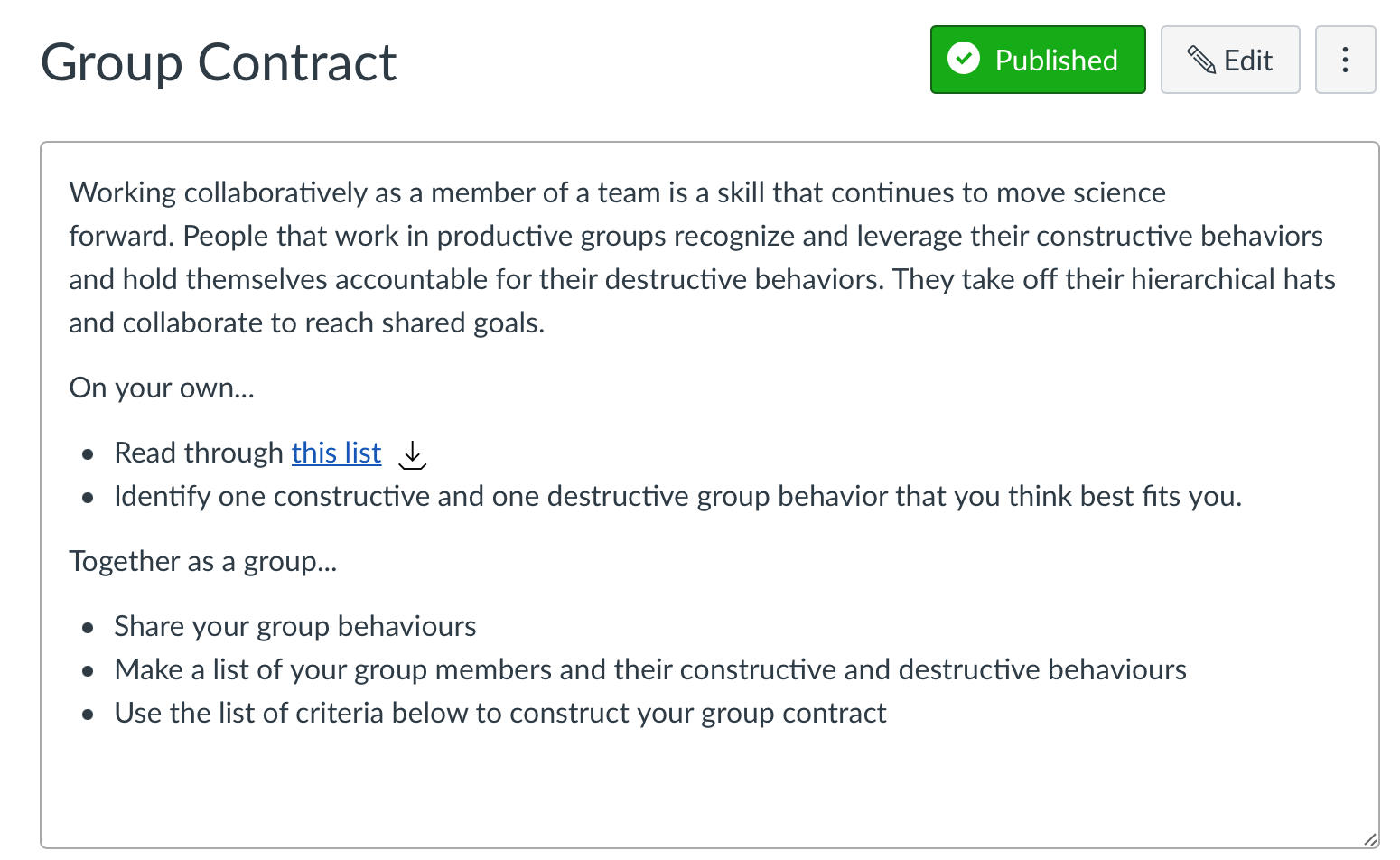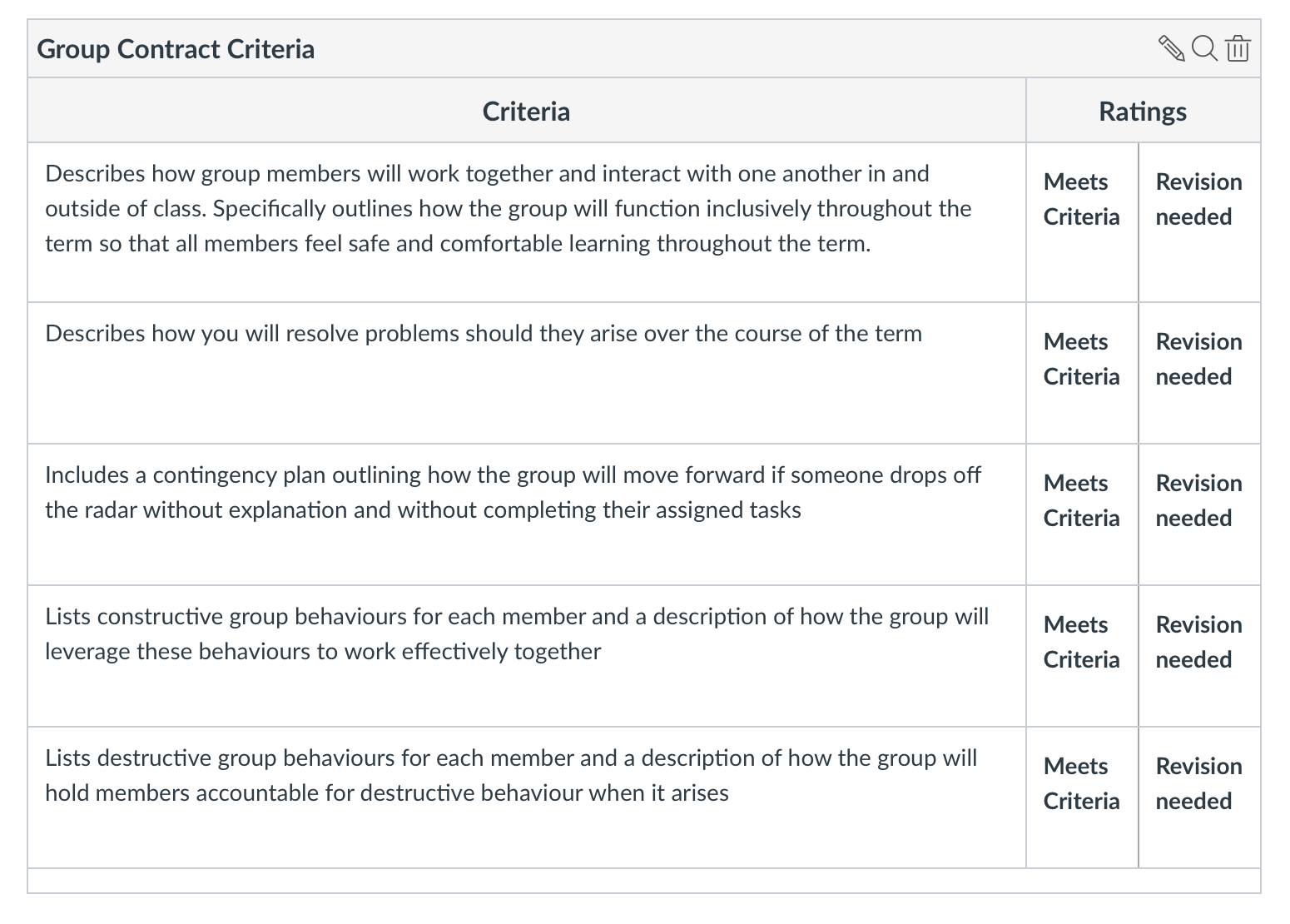BIOL140 students work together in long-term groups throughout the term, so effective teamwork is an important component of students’ experience and success. To help groups develop shared expectations and set the foundation for how group members will interact and engage with one another, one of the first group assignments is to create a Group Contract.
Students are first asked to individually review a list of constructive and destructive group behaviours and identify one of each that best fits them. Students then share these identified behaviours with their group members and work together as a group to construct a group contract based around a list of criteria prompts (see below for images of the assignment in Canvas).


Below, Blaire Steinwand, a BIOL140 course coordinator and instructor, explains how the activity is implemented in BIOL140, describes the impact it has had on students and the course, and offers some advice for anyone who might want to try something similar.
How is this activity used in the course?
This Group contract activity is one of the first group assignments in the course. Instructors create groups of 4-5 students in Week 2 once registration has settled and assign this activity towards the end of Week 2. It is then due before class in Week 3.
While some instructors find time to allow students to complete the group contracts in-class in Week 2, many instructors ask students to meet on Zoom outside of class to complete the assignment.
What impact does this activity have on students?
It raises their awareness of the behaviours that they bring to team work and allows them to have a productive discussion with their teammates about how their individual behaviours can elevate the group (in the case of a constructive behaviour) or how they can keep the group from thriving (in the case of destructive behaviours).
What impact does this activity have on the course?
The contract is something instructors can revisit when groups are struggling to work productively later on. It is both an exercise in metacognition for the students and a set of expectations that instructors and students can use to hold everyone accountable for contributing throughout the course. This activity promotes such an important conversation and sets the stage for the term. It is one that in BIOL140, we value the most.
How have the students responded?
Students appreciate the opportunity to set their own expectations for their group members. Some students come into the course feeling anxious about group work and I find that the opportunity to name their own strengths and weaknesses, and recognize that everyone brings both strengths and weaknesses to the table, helps them feel more confident in themselves and in their group’s ability to succeed together.
What have you learned or found surprising?
I am always surprised by how much students appreciate the opportunity to simply reflect on their own behaviours. They often tell me they have never thought about their own behaviour before but have been well aware of the behaviours of their group members.
What advice would you give someone who might want to do something similar in their course?
I find that just about all groups need feedback on their first draft. While students can identify their constructive and destructive behaviours, they often fail to articulate exactly how they will leverage the constructive behaviours and how exactly they will hold each other accountable for the destructive behaviours. For example, if a group member withdraws from the group, how will the rest of the group engage that person in a supportive and inclusive way that makes the withdrawing student re-engage? Or if the group has a dominator, how will the group members draw the dominating student’s attention to the fact that they are exhibiting their destructive behaviour? Often the answers to these questions require a conversation between group members. I find that I need to specifically encourage them to ASK the dominating student how they would like to be held accountable, or ASK the student that withdraws how you can best make them aware that they are withdrawing.
In a class of ~45 students, I have just 9 groups to give individual feedback to in writing, so I take the time to do this and I award them full marks when they revise their contracts. However, I find that most groups need similar feedback, so to save time in a larger course, I would maybe give verbal feedback to the class as a whole and consider giving them an opportunity to revise.